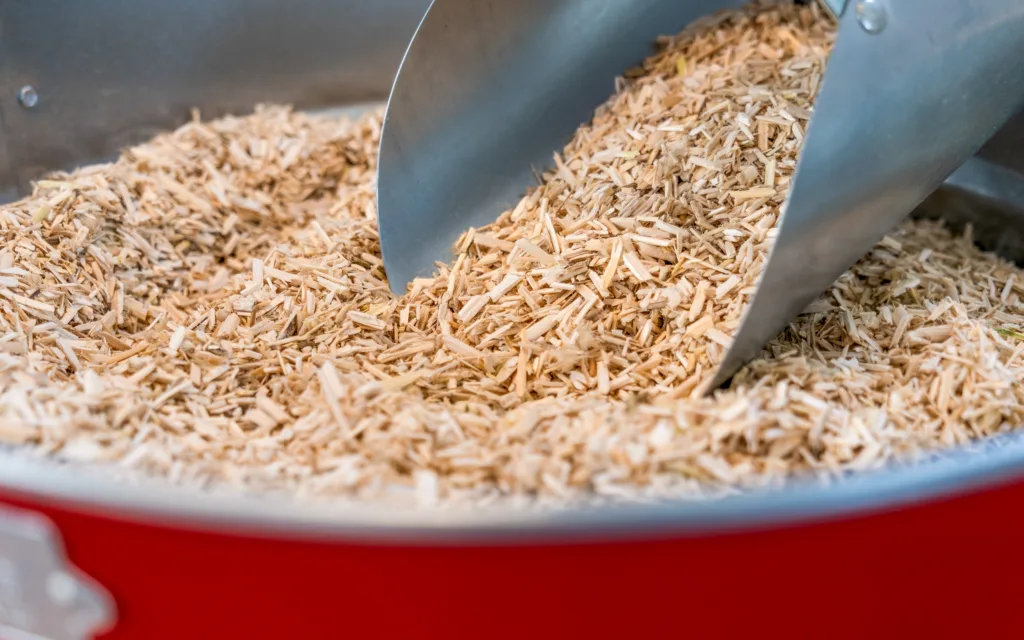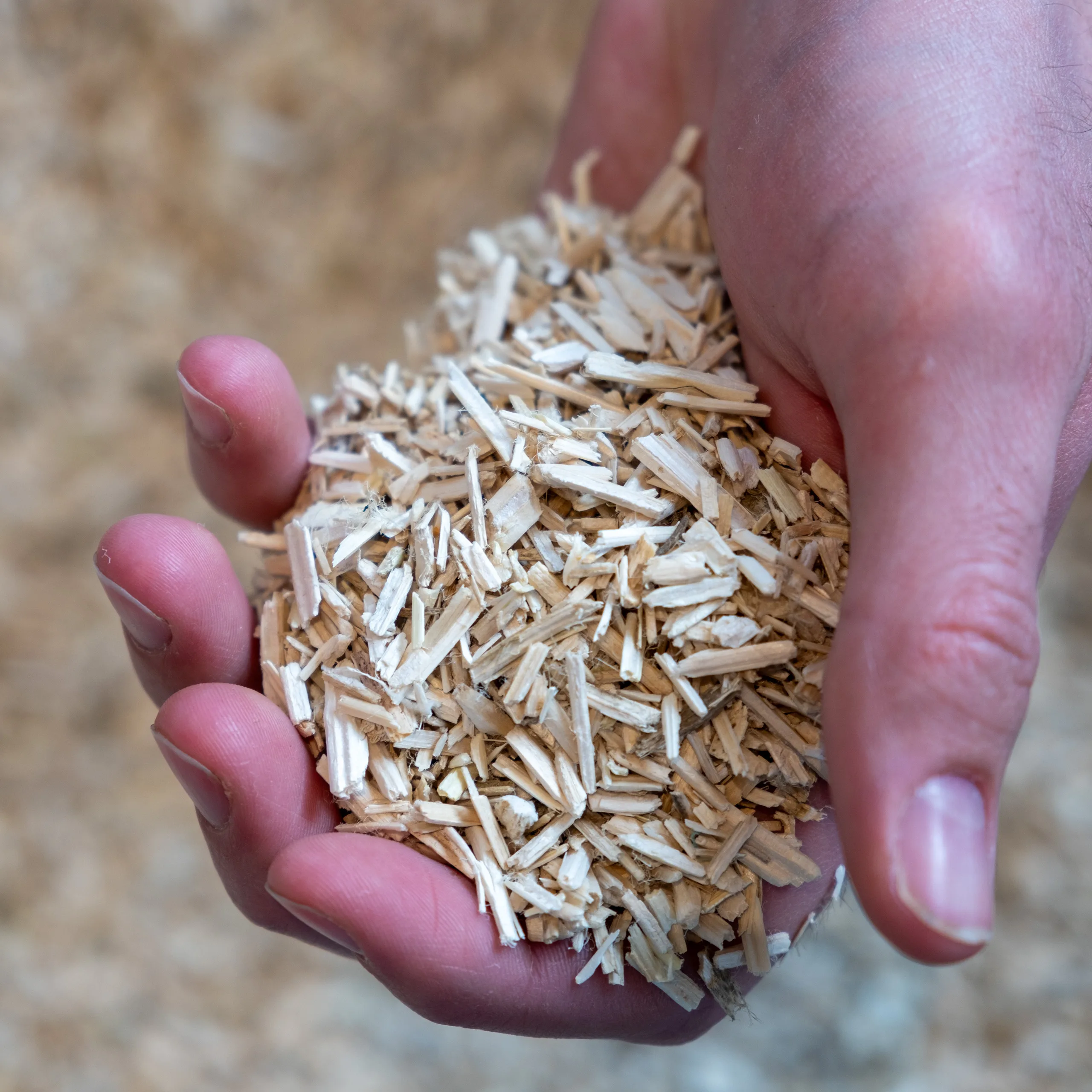Hemp hurd, the woody core of the hemp plant, remains a lesser-known byproduct compared to hemp fiber and seeds. However, as industries seek sustainable, eco-friendly materials, hemp hurd is gaining attention for its remarkable versatility and environmental benefits. Separated during fiber processing, this lightweight, highly absorbent, and biodegradable material is proving to be a game-changer across multiple sectors.
The Hidden Potential of Hemp Hurd: Unlocking an Overlooked Resource
Hemp is emerging as a popular alternative for commercial use due to its sustainability, versatility, and economic benefits. But why has it seemingly taken so long for this super product to enter viability status? Short answer: laws and stuff. Longer answer? For decades, hemp was wrongly associated with marijuana due to its botanical relationship. The U.S. Marihuana Tax Act of 1937 and later the Controlled Substances Act of 1970 classified hemp as a restricted crop, limiting production for decades. Only recently, with the 2018 Farm Bill, has industrial hemp been fully legalized in the U.S., allowing its potential to be rediscovered.
Still, hemp continues its slow climb into mainstream, and companies like ours are very happy to be introducing such a game-changer to the world. Many people still confuse hemp with marijuana, believing it has psychoactive effects. Hemp hurd, while not consumable, shares its glory with hemp hearts, which are edible but not psychoactive. Clear? Education gaps about hemp’s benefits — like its nutritional value, eco-friendliness, and industrial versatility — have prevented widespread adoption. Lack of marketing compared to mainstream products has kept hemp from entering the everyday consumer mindset.
Here Comes Hemp: 6 Reasons it’s the Future
Growing interest in sustainability is pushing industries to consider hemp for biodegradable plastics, textiles, paper, and even construction materials like hempcrete. Advances in farming technology and processing facilities are making hemp more accessible and scalable. With increasing awareness of its benefits, hemp is reclaiming its place as a reliable, eco-friendly resource for industries and consumers alike.
Without further ado, here are six stellar considerations for hemp hurd. We can only assume your excitement and creativity will run rampant upon list’s-end!
1. A Natural, Low-Dust Bedding for Animals
Hemp hurd offers a superior alternative to traditional bedding materials like straw or wood shavings. Absorbs 4-5x its weight in moisture … significantly more than straw or wood shavings. Keep your critters safe and comfy! Hemp hurd keeps habitats drier for longer, reducing the frequency of bedding changes. It prevents soggy, compacted bedding, providing a more comfortable environment for animals, large and small.
Less Stink, Less Dust
No stank you! Hemp hurd naturally neutralizes ammonia smells from urine, improving air quality, reducing bacterial growth, and keeping the bedding fresher and healthier for longer. Hemp hurd produces less dust than straw or wood shavings, making it better for respiratory health (for both animals and humans). Hurd is ideal for animals of all shapes and sizes, especially the sensitive — those prone to allergies or breathing issues. Plus, it naturally repels mites, parasites, and mold, unlike straw, which can harbor pests. It can also reduce the risk of respiratory infections and skin irritations.
More Hurd, More Benefits
Hemp hurd bedding outperforms traditional materials in absorbency, odor control, and sustainability — all while keeping animals healthier and more comfortable. As more farmers, pet owners, and animal professionals switch to hemp bedding, it’s becoming the go-to choice for cleaner, greener animal care.
2. A Game-Changer for Sustainable Construction
Hemp is revolutionizing sustainable construction by offering eco-friendly, durable, and energy-efficient materials that reduce environmental impact. As industries shift towards sustainable alternatives, hemp hurd is proving to be a renewable and high-performance material for modern construction. Builders, architects, and homeowners looking for eco-conscious solutions are turning to hempcrete, hemp fiberboard, and biodegradable hemp composites as the future of sustainable construction.
Hempcrete: A Natural Insulation & Building Material
- Carbon-Negative? Check. Absorbs CO₂ during curing, reducing a building’s carbon footprint.
- Mold & Pest Resistant? Yep! It naturally prevents mold growth and insect infestations.
- Fire-Resistant? Most definitely. High thermal mass provides better fire protection.
- Breathable & Moisture-Regulating? Solid. Prevents condensation and can improve indoor air quality.
Hemp-Based Fiberboard & Wood Alternatives
Hemp fiber is replacing traditional timber in engineered wood and composite materials, and its sustainable benefits include reducing deforestation by offering a fast-growing alternative to trees. It is both more durable and lightweight than particleboard or MDF. And hey, non-toxic and free of harmful adhesives like formaldehyde are always a plus!
Hemp Bioplastics & Eco-Friendly Composites
Hemp fibers are being used in biodegradable plastics for insulation panels and fixtures. It works to aid structural reinforcement in concrete and composite materials and is an eco-friendly option for roofing and siding materials with greater durability.
3. A Sustainable Alternative to Traditional Materials
Unlike wood, concrete, or synthetic materials, hemp hurd is an eco-friendly choice due to its multi-beneficial composition. Hempcrete is a sustainable, insulating, and carbon-negative building material, while the “softer” side relating to textiles means a breathable alternative to cotton and synthetic fabrics. There’s a plethora of green goodness to hemp hurd, including biodegradable plastics and industrial composites for automotive and packaging applications. Hemp hurd gives trees a break, too, acting as a renewable alternative to wood-based paper. And, from a fuel standpoint, hemp hurd can be converted into both bioethanol and biodiesel.
- Renewable nature – Fast-growing hemp replenishes quickly, unlike trees.
- Low water requirements – Uses significantly less water than conventional crops.
- Carbon sequestration – Absorbs CO₂, making it a carbon-negative material.
- Zero-waste processing – At Green Fox, every part of the hemp plant is utilized (not all hurd boasts this feature!).
4. Enhancing Soil Health & Eco-Friendly Gardening
Hemp is considered a green alternative for commercial use because it is sustainable, biodegradable, and reduces environmental impact compared to conventional materials. Hemp hurd is an excellent soil enhancer and protector with multiple benefits for gardening and agriculture:
- Natural mulch, this stuff retains moisture, reduces weeds, and regulates soil temperature. If that isn’t the trifecta!
- Compostable and biodegradable, hemp breaks down naturally, enriching soil with nutrients.
- Used in erosion control products like erosion socks, hemp hurd is a natural, biodegradable filler that helps stabilize soil, reduce runoff, and support healthier landscapes.
- Supports regenerative agriculture, which contributes to healthier, more sustainable farming practices. Fast-growing and high-yielding hemp matures in just 3-4 months, making it a highly renewable resource.
- Requires less water and pesticides: this one-two punch creates a powerful edge compared to cotton and other industrial crops, as hemp thrives with minimal water and no need for chemical pesticides or herbicides.
- Improves soil health: hemp’s deep roots help prevent erosion and replenish nutrients, making it excellent for crop rotation and land restoration.
Minnesota’s climate, fertile soil, water access, strong farming infrastructure, and supportive policies make it a prime location for hemp cultivation, and we at Green Fox Companies concur. As demand for hemp-based products grows, the world is going to hear a thing or two about our Minnesota-grown hemp!
5. A Sustainable Option for Paper & Wood Alternatives
Many hemp-based products break down naturally, reducing waste and pollution. Hemp can be utilized as a sustainable, biodegradable alternative to petroleum-based plastics. From a textile standpoint, hemp is far more durable and eco-friendly than cotton, requiring fewer resources to produce.
Hemp Paper replaces tree-based paper, reducing deforestation and water pollution from chemical-laden paper mills. Hemp hurd is a promising solution for reducing deforestation and reliance on traditional wood-based products:
- Paper production – Requires fewer chemicals and water than tree-based paper.
- Engineered wood & composite materials – Used in fiberboards and bioplastics.
- Helps protect forests – A renewable resource that alleviates pressure on timber supplies.
6. The Future of Hemp Hurd: More Innovation Ahead
With ongoing research and investment, hemp hurd is emerging as a critical material in the shift toward a more sustainable, low-carbon future. Its versatility, renewability, and eco-friendly properties make it a game-changer in industries seeking greener alternatives. Carbon sequestration is pretty dang exciting, too — hemp absorbs large amounts of CO₂ during its growth cycle, making it one of the most sustainable building materials available. Since it requires less water, fewer pesticides, and even helps regenerate soil, hemp hurd continues to gain momentum as a smart, scalable solution for a cleaner world. And we’re here for it..
As sustainability efforts grow, new applications for hemp hurd are gaining traction across multiple industries, including:
- Bioplastics & packaging: Offering a renewable, plant-based alternative to petroleum-based plastics.
- Biofuels: Showing promise as a clean, renewable energy source.
- Advanced composites: Used in engineered wood and sustainable product manufacturing.
With its wide range of uses and planet-friendly benefits, hemp hurd is poised to play a major role in the future of sustainable innovation and a greener future.
Why Hemp Hurd Deserves More Recognition
Hemp hurd is versatile, sustainable, and underutilized — but that’s changing fast. Whether for construction, farming, animal care, or industrial applications, this eco-friendly material has immense potential. Now is the time to explore the benefits of Green Fox Hemp Hurd and incorporate it into your sustainable lifestyle or business.

